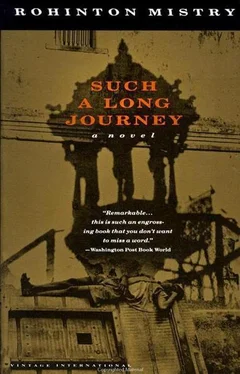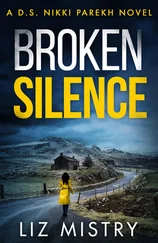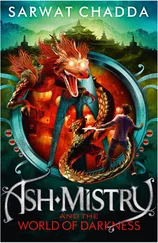While Gustad slept propped up between his fellow travellers, the Prime Minister, in a special radio broadcast, told the nation that Pakistani Air Force planes had just bombed Indian airfields in Amritsar, Pathankot, Srinagar, Jodhpur, Chandigarh, Ambala, and Agra. She said it was an act of naked aggression; and consequently, India was now at war with Pakistan. By the time the train neared Bombay, everyone aboard had heard the news, having picked up bits and pieces of information mingled with rumour at stations along the way. At Victoria Terminus Gustad tried to buy a paper, but the few remaining copies were going at five times the normal price, and he turned it down.
For good measure Dilnavaz left the lizard under Sohrab’s dholni three hours past sunrise. When it was time to visit Miss Kutpitia, she picked up the box gingerly and shook it. A reassuring rustle came from within.
What possible conjunction of Tehmul and the lizard would bring Sohrab back, she could not even begin to guess. Strange, that in Miss Kutpitia’s presence, inside that flat, doubts vanished so easily, and all her remedies became paradigms of sound, judicious action. And yet, I must be going mad, to have begged her to do this.
She pushed open the front window to look for Tehmul. He was waiting for her. ‘Limejuicelimejuice. Veryveryverytasty.’
‘No, no. No more lime juice. But Miss Kutpitia has something very nice for you. Go, she is calling.’
‘Phonephonephoneupstairs.’
‘Right, where the phone is. Go, I am also coming.’
‘Goinggoingverytasty.’ Grinning hard, he set off, right hand under left armpit. She let him have a head start of roughly two minutes before following with the box.
An air of impatience surrounded Miss Kutpitia. She bustled them inside. ‘Come on, come on, shut the door,’ she muttered. ‘Where do you think I do these things, on the staircase?’
Dilnavaz awaited her instructions. Now that the time was here, she felt trapped (helpless, she thought, as the lizard in the shoe-box). Events were already in motion; she could but watch them gather momentum and manifest the promised end. Grinding spices on the masala stone was one thing, grinding events to a halt was another. It needed a different sort of strength.
In a daze, she watched Miss Kutpitia go to one of the two closed doors and unlock it with a key from the bunch around her neck. There was a gleam in the old woman’s eyes as, in the manner of an artist unveiling the pièce de résistance, she threw open the portal and bade them enter the forbidden chamber.
The windows were shut tight, the heavy curtains drawn. Thick, stubborn odours of mildew and disuse loomed in the doorway. But Dilnavaz was reluctant to penetrate the room’s gloomy secrets. With the palpable truth behind years of rumours and stories awaiting her, she lingered timidly in the passage. Tehmul, wide-eyed and perspiring, scratched nervously.
Miss Kutpitia became impatient with the dawdling twosome. ‘Nothing will get done if you hover by the door all day!’ She pushed them inside and slammed her hand over the wall switch. A weak light came on.
Dilnavaz gasped. She was unable to decide whether to look, or look away; both desires were equally strong. So she did neither, waited till the room and its contents (with the look of things which had never been looked at) began to register gradually upon her consciousness.
Shades of grey and white shrouded everything. Cobweb wreaths and layers of dust made it difficult to identify objects, except for the ghostly furniture. But as her senses adapted to the eerie stillness and the crepuscular glow of the dim, dust-coated light bulb, the shadowy chamber started grudgingly to yield its secrets. She was now able to see that the rags hanging on the clothes-horse had once possessed the crisp, starched form of a boy’s shirt and short pants, perhaps a school uniform. From the lower rod, two dark, holey rags dangling like moults of mysterious reptiles were definitely the remains of socks. And what seemed to be a strip of shrivelled leather had been a belt of the finest snakeskin. Yes, it was clear.
Yes, she could see now, this must have been the room of Miss Kutpitia’s nephew Farad, who had once filled her cup to overflowing. The one who had died with his father in the car accident on the mountain road. And when their broken bodies were recovered from the ravine, Miss Kutpitia’s cup had shattered, as irreparably as their bones — beyond the reach of any bonesetter’s art, beyond miracles.
But Miss Kutpitia had been trying to mend and fix, ever since, in her own peculiar way. Her three and a half decades of reverently observed isolation had allowed the tropical climate to work its rot and ruin. The damp of thirty-five monsoons, rampant humidity-loving fungi, numerous types of variegated moulds — all played their clammy, smeary parts in the process of decay and disintegration. There was the boy’s desk, with an exercise book lying open, its pages curled and yellow. Next to it, a stack of textbooks, the one on top brown-paper-covered, with the title penned by a boy’s yet-to-mature hand, in fading ink that had defied the intervening years: High School English Grammar and Composition by Wren & Martin. Fountain-pen and inkpot, dry as dust. A warped, cracked ruler. Pencils. Erasers like little chunks of hardwood. Draped over a chair, a green raincoat covered with fuzzy, grey growth; under the chair, black gumboots, gone furry grey. On the bed, the mattress’s black-striped ticking showed through gaping holes in the bed-clothes where generations of moths had feasted for ten thousand nights. But the sheet and blanket were neatly arranged, the pillow in position, awaiting the occupant’s return.
The door to the adjoining room was open too, and Dilnavaz could glimpse parts of its interior. That must have been the room of Farad’s father. His lawyer’s robe, in shreds more grey than black, was suspended from the door latch on a wire hanger. Sheaves of legal documents, bundles of court papers, each tied correctly with pink cloth ribbon, were in neat piles on a metal desk. A hairbrush, shaving kit, attaché case, magazines, occupied a bedside table. And everywhere, the cobwebs hung densely, wreathing the light fixtures, curtains, doorframes, windows, cupboards, clothes-horses, ceiling fans. Like tohruns and garlands of gloom, the cobwebs had spread their clinging arms and embraced the relics of Miss Kutpitia’s grief-stricken past.
‘Stand aside, Tehmul,’ she said, irritated for no reason. ‘Don’t keep coming in my way.’ She took the box from Dilnavaz and placed it on Farad’s desk, opening the lid just a crack. In due course the lizard poked out its tongue-flicking snout. Miss Kutpitia promptly whacked it over the head with the warped ruler. She turned the box over on the desk, and, pinching the lizard’s wriggling tail between her thumb and finger, snipped off about two inches of the appendage with a pair of blunt, rusty scissors.
Dilnavaz blanched; like Tehmul, she watched in fascination. Everything Miss Kutpitia needed was at the ready in this room. Like a regular cotton wick, the tail was inserted into a wick-holder, dipped in oil, and floated in the lamp glass. Loaded with its strange cargo, the holder rocked on the oil surface as the tail continued to writhe and wiggle, but managed to stay afloat.
‘Now,’ she said to Dilnavaz, picking up her box of matches. ‘You go and stand outside. You,’ she said to Tehmul. ‘You want to have some fun?’
‘Funfunfunfunfunfun.’
‘Then sit down and pay attention to this glass.’
Tehmul giggled at the squirming tail and sat. The rotted wicker seat gave immediately. He sank, his bottom sticking out below and rendering him helpless. ‘Fallingfallingfalling,’ he appealed with a drowning man’s outstretched arms.
Читать дальше












